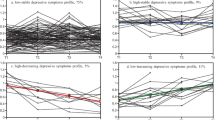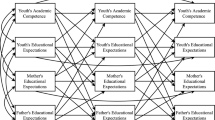Abstract
Adolescents may have educational aspirations that are different from their parents’ educational aspirations for them, and such discrepancy may affect adolescents’ psychological adjustment. This longitudinal study examined how parent-child discrepancy in educational aspirations relate to depressive symptoms in early adolescents, both concurrently and prospectively, when controlling for parents’ depressive symptoms. Moreover, parent and child gender differences in the effects were explored. Data were collected from 3799 students (52.0% boys; Mage = 10.78) and their fathers and mothers when the students were in fifth and seventh grade over 2 years. Polynomial regression with response surface analysis was used to analyze the effects of parent-child aspiration discrepancy on depressive symptoms separately in four parent-child gender dyads. Cross-sectional results demonstrated that for all parent-child gender dyads, congruently higher aspirations were related to lower depressive symptoms, and greater incongruence in aspirations was related to higher depressive symptoms. Moreover, for parent-son dyads, adolescents whose aspirations were lower than those of their parents reported higher depressive symptoms than adolescents whose aspirations were higher than those of their parents. However, longitudinal results further showed that, for father-son dyads only, congruently higher aspirations were related to increased depressive symptoms over time, while for parent-daughter dyads only, greater incongruence in aspirations was related to increased depressive symptoms over time. The findings support the importance of considering parent-child discrepancy when exploring the role of educational aspirations in adolescents’ psychological adjustment and call for a more detailed and rigorous analysis and interpretation of this relationship.



Similar content being viewed by others
References
Agliata, K. A., & Renk, K. (2009). College students’ affective distress: The role of expectation discrepancies and communication. Journal of Child and Family Studies, 18, 396–411. https://doi.org/10.1007/s10826-008-9244-8.
Almroth, M. C., László, K. D., Kosidou, K., & Galanti, M. R. (2018). Association between adolescents’ academic aspirations and expectations and mental health: A one-year follow-up study. The European Journal of Public Health, 28(3), 504–509. https://doi.org/10.1093/eurpub/cky025.
Almroth, M., László, K. D., Kosidou, K., & Galanti, M. R. (2019). Academic expectations and mental health in adolescence: A longitudinal study involving parents’ and their children’s perspectives. Journal of Adolescent Health, 64(6), 783–789. https://doi.org/10.1016/j.jadohealth.2018.11.015.
Aronen, E. T., & Soininen, M. (2000). Childhood depressive symptoms predict psychiatric problems in young adults. The Canadian Journal of Psychiatry, 45(5), 465–470. https://doi.org/10.1177/070674370004500507.
Bi, T., Zhang, T., He, S., Guo, X., Liu, C., Liu, X., & Luo, L. (2021). Trajectories of paternal self-efficacy for educational involvement in late childhood: Effects of fathers’ time and energy. Journal of Family Psychology, 35(8), 1171–1180. https://doi.org/10.1037/fam0000840.
Burke, P. J., & Stets, J. E. (2009). Identity theory. Oxford University Press.
Cheung, K., & Theule, J. (2019). Paternal depressive symptoms and parenting behaviors: An updated meta-analysis. Journal of Child and Family Studies, 28(3), 613–626. https://doi.org/10.1007/s10826-018-01316-1.
De Los Reyes, A., & Kazdin, A. E. (2005). Informant discrepancies in the assessment of childhood psychopathology: A critical review, theoretical framework, and recommendations for further study. Psychological Bulletin, 131(4), 483–509. https://doi.org/10.1037/0033-2909.131.4.483.
Duckworth, A. L., & Seligman, M. E. P. (2006). Self-discipline gives girls the edge: Gender in self-discipline, grades, and achievement test scores. Journal of Educational Psychology, 98(1), 198–208. https://doi.org/10.1037/0022-0663.98.1.198.
Edwards, J. R. (2002). Alternatives to difference scores: Polynomial regression analysis and response surface methodology. In F. Drasgow & N. Schmitt (Eds.), Measuring and analyzing behavior in organizations: Advances in measurement and data analysis (pp. 350–400). Jossey-Bass.
Evans, D., Borriello, G. A., & Field, A. P. (2018). A review of the academic and psychological impact of the transition to secondary education. Frontiers in Psychology, 9, 1482 https://doi.org/10.3389/fpsyg.2018.01482.
Ford, J. L., Boch, S. J., & Browning, C. R. (2019). Hair cortisol and depressive symptoms in youth: An investigation of curvilinear relationships. Psychoneuroendocrinology, 109, 104376 https://doi.org/10.1016/j.psyneuen.2019.104376.
Fu, R., Chen, X., Wang, L., & Yang, F. (2016). Developmental trajectories of academic achievement in Chinese children: Contributions of early social-behavioral functioning. Journal of Educational Psychology, 108(7), 1001–1012. https://doi.org/10.1037/edu0000100.
Gallagher, M. (2016). Adolescent-parent college aspiration discrepancies and changes in depressive symptoms. Sociological Perspectives, 59(2), 296–316. https://doi.org/10.1177/0731121415589137.
Gerard, J. M., & Booth, M. Z. (2015). Family and school influences on adolescents’ adjustment: The moderating role of youth hopefulness and aspirations for the future. Journal of Adolescence, 44, 1–16. https://doi.org/10.1016/j.adolescence.2015.06.003.
Guo, X., He, S., Du, Z., Bi, T., & Luo, L. (2021). Gender differences in the intergenerational transmission process of educational aspirations in late childhood. Sex Roles, 85(1), 100–112. https://doi.org/10.1007/s11199-020-01206-1.
Hale, W. W., Nelemans, S. A., Meeus, W. H., & Branje, S. J. (2020). A 6-year longitudinal study of adolescents and mothers depression symptoms and their perception of support and conflict. Child Psychiatry & Human Development, 51(3), 407–415. https://doi.org/10.1007/s10578-019-00952-y.
Hyde, J. S., Mezulis, A. H., & Abramson, L. Y. (2008). The ABCs of depression: Integrating affective, biological, and cognitive models to explain the emergence of the gender difference in depression. Psychological Review, 115(2), 291–313. https://doi.org/10.1037/0033-295X.115.2.291.
Kiang, L., Witkow, M. R., Gonzalez, L. M., Stein, G. L., & Andrews, K. (2015). Changes in academic aspirations and expectations among Asian American adolescents. Asian American Journal of Psychology, 6(3), 252–262. https://doi.org/10.1037/aap0000025.
Knafo, A., & Schwartz, S. H. (2009). Accounting for parent-child value congruence: Theoretical considerations and empirical evidence. In U. Schönpflug (Ed.), Cultural transmission: Psychological, developmental, social, and methodological aspects (pp. 240–268). Cambridge University Press.
Kovacs, M. (1992). Children’s Depression Inventory. Multi-Health Systems.
Kwong, A. S., Manley, D., Timpson, N. J., Pearson, R. M., Heron, J., Sallis, H., & Leckie, G. (2019). Identifying critical points of trajectories of depressive symptoms from childhood to young adulthood. Journal of Youth and Adolescence, 48(4), 815–827. https://doi.org/10.1007/s10964-018-0976-5.
Laird, R. D., & De Los Reyes, A. (2013). Testing informant discrepancies as predictors of early adolescent psychopathology: Why difference scores cannot tell you what you want to know and how polynomial regression may. Journal of Abnormal Child Psychology, 41(1), 1–14. https://doi.org/10.1007/s10802-012-9659-y.
Lamb, M. E. (2010). How do fathers influence child development? Let me count the ways. In M. E. Lamb (Ed.), The role of the father in child development (5th ed., pp. 1–26). Wiley.
Large, M. D., & Marcussen, K. (2000). Extending identity theory to predict differential forms and degrees of psychological distress. Social Psychology Quarterly, 63(1), 49–59. https://doi.org/10.2307/2695880.
Lovibond, P. F., & Lovibond, S. H. (1995). The structure of negative emotional states: Comparison of the Depression Anxiety Stress Scales (DASS) with the Beck Depression and Anxiety Inventories. Behaviour Research and Therapy, 33(3), 335–343. https://doi.org/10.1016/0005-7967(94)00075-U.
Lv, B., Zhou, H., Liu, C., Guo, X., Zhang, C., Liu, Z., & Luo, L. (2018). The relationship between mother-child discrepancies in educational aspirations and children’s academic achievement: The mediating role of children’s academic self-efficacy. Children and Youth Services Review, 86, 296–301. https://doi.org/10.1016/j.childyouth.2018.02.010.
Ma, Y., Siu, A., & Tse, W. S. (2018). The role of high parental expectations in adolescents’ academic performance and depression in Hong Kong. Journal of Family Issues, 39(9), 2505–2522. https://doi.org/10.1177/0192513X18755194.
Mossakowski, K. N. (2011). Unfulfilled expectations and symptoms of depression among young adults. Social Science & Medicine, 73(5), 729–736. https://doi.org/10.1016/j.socscimed.2011.06.021.
Muenks, K., Wigfield, A., & Eccles, J. S. (2018). I can do this! The development and calibration of children’s expectations for success and competence beliefs. Developmental Review, 48, 24–39. https://doi.org/10.1016/j.dr.2018.04.001.
Peterson, J., Duncan, N., & Canady, K. (2009). A longitudinal study of negative life events, stress, and school experiences of gifted youth. Gifted Child Quarterly, 53(1), 34–49. https://doi.org/10.1177/0016986208326553.
Ponnet, K., Wouters, E., Mortelmans, D., Pasteels, I., De Backer, C., Van Leeuwen, K., & Van Hiel, A. (2013). The influence of mothers’ and fathers’ parenting stress and depressive symptoms on own and partner’s parent-child communication. Family Process, 52(2), 312–324. https://doi.org/10.1111/famp.12001.
Rutherford, T. (2015). Emotional well-being and discrepancies between child and parent educational expectations and aspirations in middle and high school. International Journal of Adolescence and Youth, 20(1), 69–85. https://doi.org/10.1080/02673843.2013.767742.
Salk, R. H., Hyde, J. S., & Abramson, L. Y. (2017). Gender differences in depression in representative national samples: meta-analyses of diagnoses and symptoms. Psychological Bulletin, 143(8), 783–822. https://doi.org/10.1037/bul0000102.
Seginer, R. (2009). Future Orientation Sex Differences. In Seginer, R. (Ed.), Future Orientation (pp. 91–123). Springer. https://doi.org/10.1007/978-0-387-88641-1_4.
Taylor, S. E., & Brown, J. D. (1999). Illusion and well-being: A social psychological perspective on mental health. In R. F. Baumeister (Ed.), The self in social psychology (pp. 43–68). Psychology Press.
Timbremont, B., Braet, C., & Dreessen, L. (2004). Assessing depression in youth: relation between the Children’s Depression Inventory and a structured interview. Journal of Clinical Child and Adolescent Psychology, 33(1), 149–157. https://doi.org/10.1207/S15374424JCCP3301_14.
Trautner, H. M., & Eckes, T. (2000). Putting gender development into context: Problems and prospects. In T. Eckes & H. Trautner (Eds.), The developmental social psychology of gender (pp. 419–435). Lawrence Erlbaum.
Trautwein, U., Lüdtke, O., Marsh, H. W., Köller, O., & Baumert, J. (2006). Tracking, grading, and student motivation: Using group composition and status to predict self-concept and interest in ninth-grade mathematics. Journal of Educational Psychology, 98(4), 788–806. https://doi.org/10.1037/0022-0663.98.4.788.
Yamamoto, Y., & Holloway, S. D. (2010). Parental expectations and children’s academic performance in sociocultural context. Educational Psychology Review, 22(3), 189–214. https://doi.org/10.1007/s10648-010-9121-z.
Yu, D., & Li, X. (2000). Preliminary use of the Children’s Depression Inventory (CDI) in China. Chinese Mental Health Journal, 14(4), 225–227.
Author information
Authors and Affiliations
Contributions
X.G. conceived of the study, participated in its design, performed the statistical analysis, and drafted the manuscript; H.Q. supported the data collection and analysis and helped to draft the manuscript; K.J. supported the data collection and analysis and helped to draft the manuscript; L.L. conceived of the study, participated in its design, drafted the manuscript, and supervised the study. All authors read and approved the final manuscript.
Funding
The study is supported by the Major Project of National Social Science Fund of China (16ZDA229).
Data Sharing and Declaration
The datasets generated and analyzed during the current study are not publicly available but are available from the corresponding author on reasonable request.
Corresponding author
Ethics declarations
Conflict of Interest
The authors declare no competing interests.
Ethical Approval
All procedures performed in the present study were in accordance with the recommendations of the Research Ethics Committee of the Beijing Normal University and with the Declaration of Helsinki.
Informed Consent
Written informed consent was obtained from the involved schools and parents of the participated students.
Additional information
Publisher’s note Springer Nature remains neutral with regard to jurisdictional claims in published maps and institutional affiliations.
Supplementary Information
Rights and permissions
About this article
Cite this article
Guo, X., Qin, H., Jiang, K. et al. Parent-Child Discrepancy in Educational Aspirations and Depressive Symptoms in Early Adolescence: A Longitudinal Study. J Youth Adolescence 51, 1983–1996 (2022). https://doi.org/10.1007/s10964-022-01644-y
Received:
Accepted:
Published:
Issue Date:
DOI: https://doi.org/10.1007/s10964-022-01644-y




